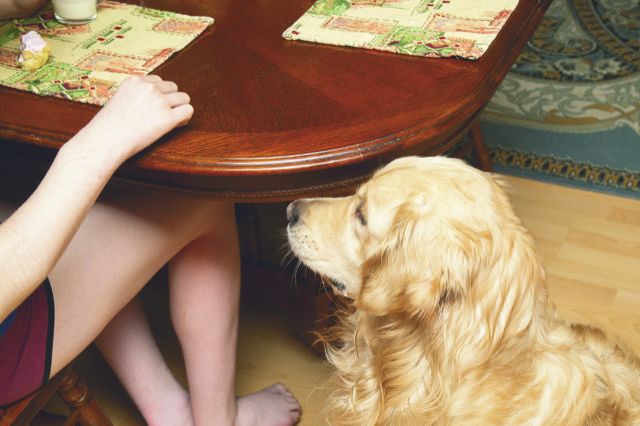Your dog’s begging at the table has gotten out of hand. You’re happy to drop him a piece of food here and there, but when you say no, he keeps beseeching — putting his head right at the table ledge even when you tell him to move away, staring at you, yawning, whining, and perhaps even nudging you with his paw.
Or he won’t take no for an answer about sleeping on the bed. You don’t mind letting him up some nights and in fact even enjoy the snuggly warmth — and the happiness he feels when he’s allowed to sleep right on the mattress with you. But there are other times you’re just not in the mood. You want the space without him moving around and waking you.
Why is he trying to take advantage, turning your loving gestures into “assignments” that he expects you to complete whenever he says? Why is he such a bad dog?
He’s not. The issue is that you’re a misguided human.
Consider first that dogs are born opportunists. If they feel there might be an opening, they’re going to go for it. Thus, if you tune them into the possibility of an opening with your on-again off-again approach, they will act accordingly. It all comes down to the fact that you’re trying to teach your dog the word “sometimes,” but that word entails a concept that’s absent from how a dog learns to understand what you’re saying.
Consider that when a dog learns a word, he’s not learning it the way we do. The word is simply a sound to him — like a gong or a clap or a chime — that serves as a cue for the behavior you’re trying to elicit. For example, if you say the word “sit,” he’s not learning it the way someone learns a language. He just knows that when he hears that particular syllable it means that if he puts his rump on the floor he might get a treat. It’s the same for every other word you teach him. It has no meaning as a word in itself. It’s just a signal that he’ll be rewarded, with your calmness if not with a treat, if he follows through.
The word “sometimes” just doesn’t fit into that system. The only way a dog can do what you want is if you apply the same cues consistently. There’s no possibility for his brain to cognate that it’s okay to come over for food when you’re in the mood but not when you just want to eat in peace or when you have Aunt Susie over for dinner because she doesn’t like dogs. In fact, when you yell at him for doing something that you have let him do other times, he just feels bad. He doesn’t know why you’re now angry and feels he doesn’t know how to cooperate.
It has to be all or nothing
Because dogs don’t get “sometimes,” it’s important to send the same signal every time a given situation arises. Either the dog can always come to the table for some of your dinner or never. Either the dog can always sleep on the bed or not. It may seem cruel, but it’s actually reassuring to a dog to be secure in knowing what you expect from him.
Don’t worry; there are plenty of solutions for showing your love. Maybe it’s to garnish your pet’s meals with some scraps from your own meal once you finish. That way, he gets to eat what he finds delectable without badgering you. And maybe you can put a dog bed in your room so that he’s always near you at night even if he’s not right next to you.
A final note: If you’ve been allowing your dog to do something sometimes and want to put and end to it, you’ll need to go cold turkey. If you try to do it less and less often, your pet won’t get what you mean. He’ll still think you’re talking about “sometimes” and won’t let up. Find other ways to make him feel good when you take away something that he has gotten used to enjoying here and there.





